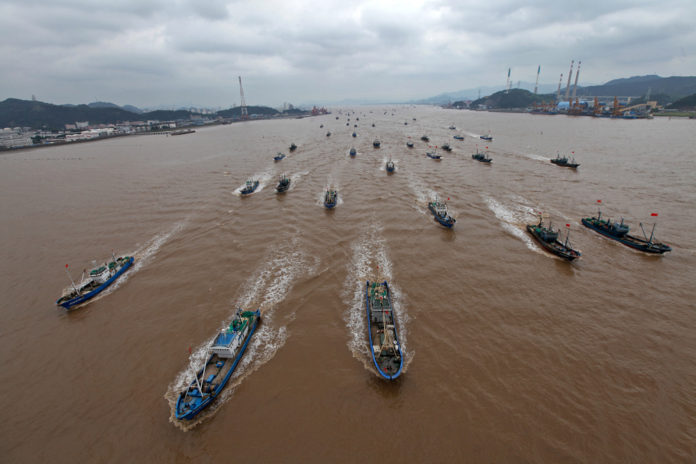On Aug. 5, 2017, China complied with a United Nations decision and formally imposed sanctions on North Korea, including a ban on seafood exports. Seafood, particularly squid, is one of North Korea’s few significant foreign-exchange earners, and the sanctions were expected to increase the pressure on the regime.
But just a few weeks after the ban came into effect, hundreds of squid-fishing vessels left Chinese waters and rounded the southern tip of South Korea. They entered North Korea’s 200 nautical-mile exclusive economic zone (EEZ), nearly doubling the number of Chinese fishing vessels operating there from 557 to 907, according a recent Global Fishing Watch report that tracked data from four different satellite systems. Even as China publicly claimed that is was complying with sanctions, many of the Chinese vessels continued to make trips to North Korea and back, including several round trips each year during both 2018 and 2019, said Jaeyoon Park, one of the report’s lead authors.
The Chinese fleet, made up of squid jiggers and pair trawlers, scooped up a staggering amount of squid—equal to almost as much as the entire squid catch in Japanese and South Korean waters combined over the same period, the report estimated. The Chinese decimated the squid population off North Korea to such a degree that Japanese and South Korean fishers saw their own take of the usually plentiful, migratory species plummet.
So the Chinese could clear out the squid undisturbed, the North Korean navy chased away North Korean fishing vessels from their own traditional fishing grounds, said Peter Oh, a defector from North Korea who monitors the country’s food situation and reports for Radio Free Asia. That’s because the Chinese were by no means unwelcome interlopers. In fact, they were fishing at the invitation of the North Korean government, Oh said. Citing South Korean intelligence sources, he said North Korea sold to China some 3,000 vessel licenses—each valid for one trip—beginning in 2017, up from around 900 in previous years. With each costing about half a million yuan ($73,000), the deal allowed Pyongyang to recoup $220 million of the estimated $1 billion export losses from the 2017 round of U.N. sanctions.
China’s great North Korean squid heist deprived some of the world’s most malnourished people of one of their few sources of protein. For three years, ordinary North Koreans had virtually no affordable animal protein in their diet and had to rely on a low-nutrition soy product called man-made meat, according to Oh, who cited sources in Dandong, China, the border city through which 80 percent of the trade between the two countries passes. Of what little squid the North Koreans themselves were able to catch, much went to the North Korean elite and the military. “In the markets, all you can find is stinky, rotten squid or no squid at all,” Oh said. Other sources report that it’s not just squid the Chinese caught, and that other types of fish have disappeared from North Korean markets as well. The fishing frenzy only stopped this past summer, when North Korea, fearing a spread of COVID-19, expelled the Chinese vessels, Oh added.
- South Korean marines and navy soldiers conduct a crackdown against Chinese fishing in waters near Ganghwa Island, South Korea, on June 10, 2016, in a photo provided by the the South Korean Defense Ministry,. South Korean Defense Ministry via Getty Images
- Activists display anti-China placards and flags during a protest at a park in Manila on June 18, 2019, after a Chinese vessel collided with a Philippine fishing boat which sank in the disputed South China Sea and sailed away sparking outrage. TED ALJIBE/AFP via Getty Images
While Spanish sailboats started fishing cod off the coast of Newfoundland in the 15th century, the Chinese fishing fleet only ventured further afield in 1985, when 13 trawlers were sent to plough northwest Africa’s fish-rich coastal waters. Today, according to a report by the British Overseas Development Institute, China’s blue-water fishing fleet is by far the world’s largest, and includes 12,490 unique vessels that were observed to have been fishing outside China’s internationally recognized EEZ in 2017 and 2018. That’s many times more than previous estimates, and very different from China’s own claim of having only 3,000 ships fishing international or other countries’ waters—but that’s only because China doesn’t recognize the United Nations Law of the Sea Treaty’s demarcation of maritime borders.
Though China isn’t alone in its destructive fishing practices, it stands apart by virtue of its sheer size and the extent to which it pushes its highly subsidized fleet across the world’s oceans. It’s also the only country whose fishing fleet has a geopolitical mission, taking over weaker countries’ waters and expanding Beijing’s maritime territorial ambitions. One of the malicious consequences of all this is that China’s monster fishing fleet robs poorer nations—from North Korea to the countries of West Africa—of desperately needed protein.
The North Korean case is especially nefarious, given Pyongyang’s long record of trading scarce food for foreign exchange with little care for the health and lives of its own people. But the real force driving this and other human-rights disasters is China’s hunger for seafood. China’s 1.4 billion people not only consume 38 percent of global fish production, but indulge in one of the highest per-capita consumption rates of fish and seafood, both wild and farmed, in the world—37.8 kilograms per person per year, up from only 7 kilograms per person per year in 1985, according to figures provided by China to the U.N. Food and Agriculture Organization.
While much has been written about Chinese overfishing, it’s only recently become possible to document its vast extent, thanks to new satellite technologies such as those providing data to Global Fishing Watch. The same tracking technology that is used to prevent vessels from hiding or circumventing sanctions shows that China’s fishing fleet appears engaged, often illegally, in the effort to haul in as much seafood as it can, as fast as it can, in as many places as it can—with little regard for how its practices affect malnourished people or diminish the stocks of their fish.
This effort is not simply the sum of individual decisions made by skippers. It is government policy, because most vessels are in effect paid to fish by the Chinese government, which covers the fleet’s main operating expense: fuel. According to Rashid Sumaila, a fisheries economist at the University of British Columbia, China’s yearly bill for fisheries subsidies—of which 94 percent covers shipping fuel—comes to $5.9 billion. That’s about $347,000 per vessel per year, far more than any other major fishing country. European Union vessels, also considered highly subsidized, receive only about $23,000 a year, Sumaila said.
China’s single-minded drive to maximize catch should come as no surprise, because its record contains little in the way of sustainable fishing. Its own coastline, once among the richest in the world, has been more overfished by its 300,000-strong domestic coastal fleet than the waters of almost any other nation, with less than 15 percent of the original fish biomass remaining. The majority of the fleet is made up of artisanal boats with small engines, going out for short trips near the shore; the rest are mostly trawlers destroying fish habitat as they rake the seafloor.
- A Chinese-flagged ship confiscated by the Ecuadorean Navy in the waters of the Galapagos marine reserve on Aug. 25, 2017. JUAN CEVALLOS/AFP via Getty Images
- Inhabitants of Santa Cruz Island in Galapagos, Ecuador, took to the streets on Aug. 25, 2017, to protest illegal fishing around the islands after the Ecuadorian Navy reported that it caught a Chinese fishing vessel in its waters. JUAN CEVALLOS/AFP via Getty Images
The waters off Argentina are a rare area where seafood is still abundant. Some 250 Chinese vessels fish for squid just outside Argentina’s 200-mile EEZ, sometimes dashing into Argentina’s waters illegally. When a Chinese jigger intruded in 2018, an Argentine warship pursuing it was nearly rammed by three other Chinese jiggers. “It’s literally a war,” said Milko Schvartzman, a former Greenpeace campaign manager and fisheries expert who estimates the illegal Argentinian fishery at $1 billion a year. “I have no doubt this will end in tragedy.”
China’s South Atlantic fishing fleet is based in Montevideo, the capital and main port of Uruguay, Argentina’s northern neighbor. Uruguay seems to have given China and its fishing fleet a free hand. “Absolutely no real controls are made of any foreign fishing boat,” Schvartzman said.
Normally, fishing vessels fly the flag of their home country, which regulates how they pay and treat crew, observe safety and pollution rules, and fish where and when they’re supposed to. To circumvent these rules and avoid compliance, which can increase costs, many shipping companies register their vessels in unregulated jurisdictions—so-called flags of convenience that include Liberia, Panama, and some Pacific and Caribbean island states. But Chinese authorities don’t enforce many rules either, so very few Chinese ships opt to fly flags of convenience. “They are their own flag of convenience,” Schvartzman said. “And they effectively created a port of convenience—a pirate port—in Montevideo.”
There, the Chinese not only make up 40 percent of the foreign fleet, but have also drawn attention with the high number of dead crew members they have been reported to bring in—about one a month. “Conditions on their boats are horrible, some of the worst in the world,” Schvartzman said. “Sometimes they dump the bodies at sea, but usually they don’t because the crew would rebel.”
In 2018, the Chinese unveiled plans to build their own separate port west of Montevideo—including massive facilities to process the catch of some 500 fishing ships. The project secured the support of Uruguay’s president but collapsed after drawing strong local opposition.
- Local fishermen sail towards the port in Tulear, Madagascar, on Nov. 3, 2018. Already threatened by the effects of global warming, Malagasy fishermen see their traditional way of life threatened by Chinese fishing boats following a fishing agreement between Chinese investors and Madagascar parastatal entities. MARCO LONGARI/AFP via Getty Images
- A crew member of a Chinese fishing trawler stands aboard the vessel docked at the port of Abidjan after being stopped by an Ivory Coast Navy patrol and being accused of fishing illegally off the coast of the West African country on Nov. 28, 2014. ISSOUF SANOGO/AFP via Getty Images
In Mozambique, the Chinese were more successful. In 2017, they effectively took over the port of Beira, doubling its capacity so it could accommodate over 100 trawlers, according to Pierre Failler, a fisheries economist who heads the Centre for Blue Governance at the University of Portsmouth. The Mozambican Channel, between Madagascar and Mozambique, had been relatively unfished, and the Chinese fleet has been able to catch over 60,000 tons a year of large, high-quality bottomfish like seabream and groupers, all of which go to China. “They pay the government a pittance for the right to fish,” Failler said. “The locals now complain they aren’t catching anything anymore.”
On the other side of the continent in northwest Africa, the Chinese built around 20 fishmeal plants to process sardinella, a once-abundant and highly nutritious mackerel-sized fish, into feed for aquaculture and poultry. That industry has created a similar situation as in North Korea: During the winter dry season, smoked sardinella constituted the main source of affordable protein for the region, one of the poorest in the world. In Gambia, Chinese companies operate three fishmeal plants built five years ago and suck up so much sardinella that the local supply is reduced to a trickle. “It’s devastating,” said Mustapha Manneh, a Gambian journalist. “Gambians depend on this fish for their daily meal.” In Kartong, where he lives, he says the price has risen five-fold. Further inland in Koina, where the country reaches into the arid Sahel region, sardinella prices have risen tenfold. Fishing in the Gambia river instead can’t compensate for the loss of sardinella. “It is dangerous because there are so many hippos,” Manneh said. “The destruction cannot be overemphasized.”
Daniel Pauly, a prominent fisheries scientist at the University of British Columbia, is the co-author of a study that found that 90 percent of fishmeal is made from perfectly edible fish like sardinella. Its exploitation has created an absurd cycle of destruction pushed by governments: They heavily subsidize unprofitable fisheries chasing diminished fish populations. Half the global catch, much of it taken from or near the waters of poor countries, is then turned into fishmeal to grow fish like salmon, which are consumed in rich countries. “If they ended the subsidies, fishing would be halved, fish stocks would quickly grow back and double in size,” Pauly explained. “You could then sustainably double the original catch, which would be cheaper to fish and not require subsidies, and you wouldn’t need to farm so much fish,” he adds. “We’re stuck in a vicious circle when a virtual one has always been obvious.”
Besides its gigantic size and extreme level of subsidies, there is a third characteristic that sets the Chinese fishing fleet apart: its use by Beijing as a tool of expansion. It was Republic of China President Chiang Kai-shek who, in 1947, laid claim to large swaths of the South China Sea—claims that were adopted by People’s Republic of China founder Mao Zedong. Greg Polis, a China specialist at the Center for Strategic and International Studies in Washington, said that to further some of these claims, China has been paying fishermen to cast their nets around the Paracel Islands since the 1970s and the Spratlys since the 1980s. The two groups of islands, or parts of them, are also claimed by Brunei, Malaysia, the Philippines, Taiwan, and Vietnam.
Disputed Claims in the South China Sea
Source: Center for Strategic and International Studies, Permanent Court of Arbitration
China is the only country with a strategic fishing fleet. Of the crew on the vessels operating in the South China Sea, Polis said “either they’re fishers paid to go fish somewhere, and that’s the only reason they do it, or they are officially in the militia, which means they never fish—they just use fishing boats to monitor other fleets, run supplies, or ram other boats.” Pauly, the fisheries scientist, said that “no one else does this except in war.”
In the last decade, Polis said, these efforts “have become much more professional, the tip of the spear for the sovereignty claims in the South China Sea.” Philip Chou, a senior advisor for the Washington-based environmental NGO Oceana, said that the Chinese aren’t only fishing in the EEZs of Indonesia, the Philippines, and Vietnam, “but they’re preventing, sometimes violently, those countries’ own fishermen from fishing there.”
A member of Ivory Coast’s Navy patrols past two Chinese fishing trawlers docked at the port of Abidjan after being accused of fishing illegally off the coast on Nov. 28, 2014. ISSOUF SANOGO/AFP via Getty Images
But even if it causes enormous damage worldwide, the Chinese fishing fleet—with the exception of its strategic military wing in the South China Sea—operates within the bounds of what Pauly calls “a corrupt, chaotic international system.” As long as other countries subsidize their fleets, Beijing will as well. If China stopped its subsidies, Pauly said, “they would lose half their catch, and they would be the only ones in the world to do it.” The Europeans, in particular, are also involved in a lot of illegal fishing, said Vanya Vulperhorst, director of Oceana’s campaign against illegal fishing, often using boats with non-European flags to get around the rules. The illegal market in Mediterranean bluefin tuna, for example, is twice the size of the legal one, according to Europol.
There is a glimmer of hope. At the World Trade Organization, talks are underway to reduce fishing subsidies, with an agreement due by the end of the year. According to Isabel Jarrett, who manages the Pew Charitable Trust’s campaign to reduce harmful fisheries, “China is pragmatic, not obstructive,” and is considered likely to cut its subsidies if everyone else does. Until then, however, China’s monster fishing fleet will continue to deplete the oceans, and millions of impoverished North Koreans, Africans, and others will go hungry.
Credit: Source link






































